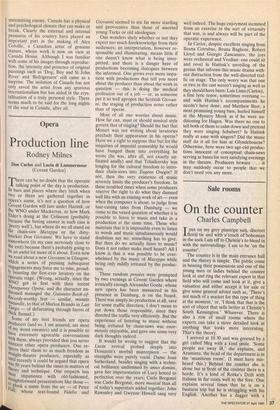Opera
Production line
Rodney Milnes
Don Carlos and Lucia di Lammermoor (Covent Garden) There can be no doubt that the operatic talking point of the day is production. In bars and places where they bitch when two or three are gathered together in opera's name, it's not a question of how Covent Garden will fare under Haitink, or the WNO under Mackerras, or how Mark elder's doing at the Coliseum (probably because the boring answer in each case is `Pretty well'), but where do we all stand on the chain-saw Mazeppa or the dirty- knicker Don Giovanni. We have to stand somewhere (in my case nervously close to the exit) because there's probably going to he an awful lot more of it about. Even now we read about a new Giovanni in Glasgow, which a series of pressing subsequent engagements may force me to miss, proud- ly boasting the first-ever lavatory on the operatic stage. (Wrong, actually, since the WNO got in first with their recent Threepenny Opera, and the character en- throned managed the Guinness-Book-of- Records-worthy feat — similar, mutatis Tutandis, to that of Marlon Brando in Last Tango — of defaecating through layers of thick flannel.) Some of my best friends are opera Producers (and so, I am assured, are most my worst enemies) and it is possible to have extremely agreeable conversations with them, always provided that you never Mention other opera producers. One re- spects their claim to as much freedom as straight-theatre producers, especially as until recently it could be argued that opera was 50 years behind the times in matters of 1,11eory and technique. One respects less "eir impatience with old-fashioned, straightforward presentations like those — 11°, Pluck a name from the air — of Peter 'all, whose text-bound Fidelio and
Giovanni seemed to me far more startling and provocative than those of assorted young Turks or old ideologues.
One wonders shyly whether or not they expect too much foreknowledge from their audiences; an interpretation, however re- sponsible and illuminating, means little if one doesn't know what is being inter- preted, and there is a danger here of productions becoming dialogues between the informed. One grows ever more impa- tient with productions that tell you more about the producer than about the work in question — this is doing the medical
profession out of a job — or, as someone put it so well apropos the Scottish Giovan- ni, the staging of production notes rather than of operas.
Most of all one worries about music. How far can, must or should musical style govern that of staging? Should the fact that Mozart was not writing about lavatories preclude their appearance in his operas?
Have we a right to suppose that but for the iniquities of imperial censorship he would have bunged them into everything he wrote (he was, after all, not exactly un- fixated anally) and that Tchaikovsky was longing for the cultural freedom to intro- duce chain-saws into Eugene Onegin? If not, then the very existence of music severely limits the producer's freedom. In these troubled times when some producers reserve the right to do what they damned well like with an existing work of art — even when the composer is about, to judge from hair-raising tales from Duisburg — we come to the vexed question of whether it is possible to listen to music and take in a production at the same time. Those who maintain that it is impossible even to listen to words and music simultaneously would doubtless say no: something has to give. But then do we actually listen to music? Does it not rather make itself heard? All I know is that it was possible to be over- whelmed by the music of Mazeppa while being only mildly irritated by the produc- tion.
These random pensees were prompted by two evenings at Covent Garden where ironically enough Alexander Goehr, whose new opera has been massacred in his presence in Duisburg, is on the board. There was simply no production at all, save for some traffic direction; I don't mean to put down those responsible, since they directed the traffic very efficiently. But the experience of listening to music without being irritated by chain-saws was enor- mously enjoyable, and gave one some very dark thoughts indeed.
It would be wrong to suggest that the Lucia revival probed deeply into Donizetti's morbid masterpiece — the strengths were purely vocal. Dame Joan Sutherland, besides singing with a techni- cal brilliance undimmed by anno domini, gave her impersonation of Lucy honed to perfection over the years; Carlo Bergonzi was Carlo Bergonzi, more musical than all of today's superstars added together; John Rawnsley and Gwynne Howell sang very well indeed. The huge enjoyment stemmed from an exercise in the sort of virtuosity that was, is and always will be part of the operatic experience.
In Carlos, despite excellent singing from Ileana Cotrubas, Bruna Baglioni, Robert Lloyd and Giorgio Zancanaro, the joys were orchestral and Verdian: one could sit and revel in Haitink's unveiling of the genius that informs this music drama with- out distraction from the well-directed traf- fic on stage. The only worry was that one or two in the cast weren't singing as well as they should have been: Luis Lima (Carlos), a fine lyric tenor, sometimes oversang and with Haitink's accompaniments he needn't have done; and Matthew Best, a most promising young bass, hurled himself at the Mystery Monk as if he were au- ditioning for Hagen. Was there no one to tell both of them to calm down and pretend they were singing Schubert? Is Haitink really at ease with singers? Did the music staff do it all for him at Glyndebourne? Otherwise, here were two age-old produc- tions innocent of conceptual chain-saws serving as bases for very satisfying evenings in the theatre. Producers beware . . . it may suddenly occur to people that we don't need you any more.


















































 Previous page
Previous page